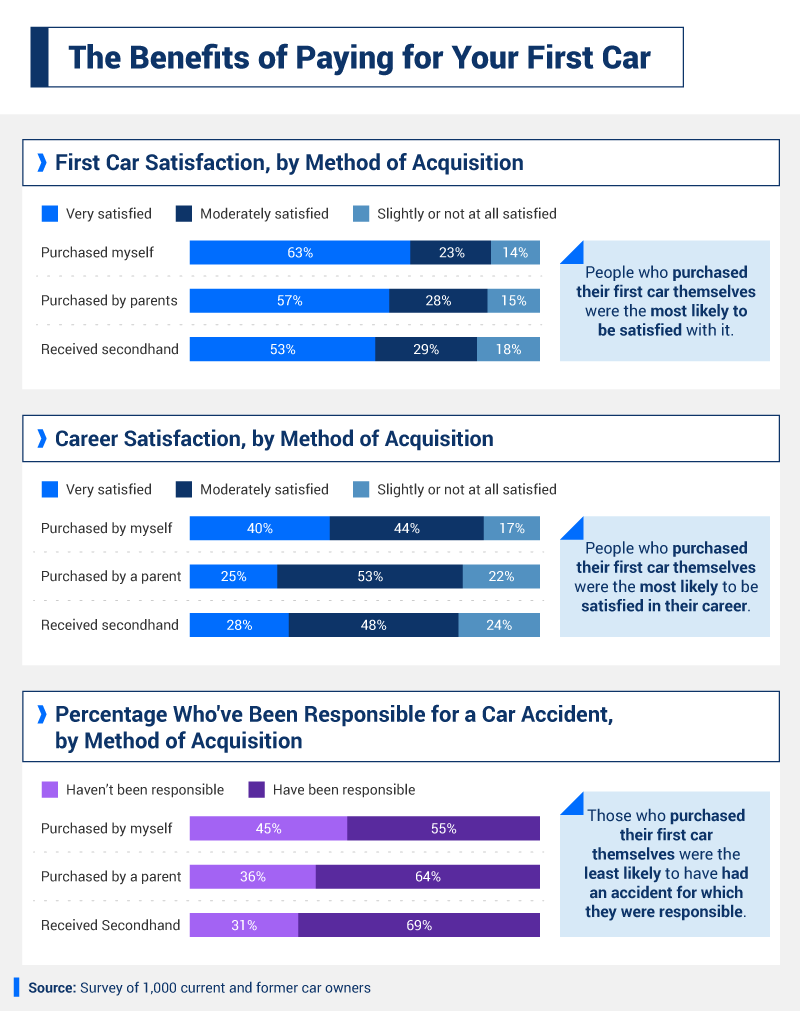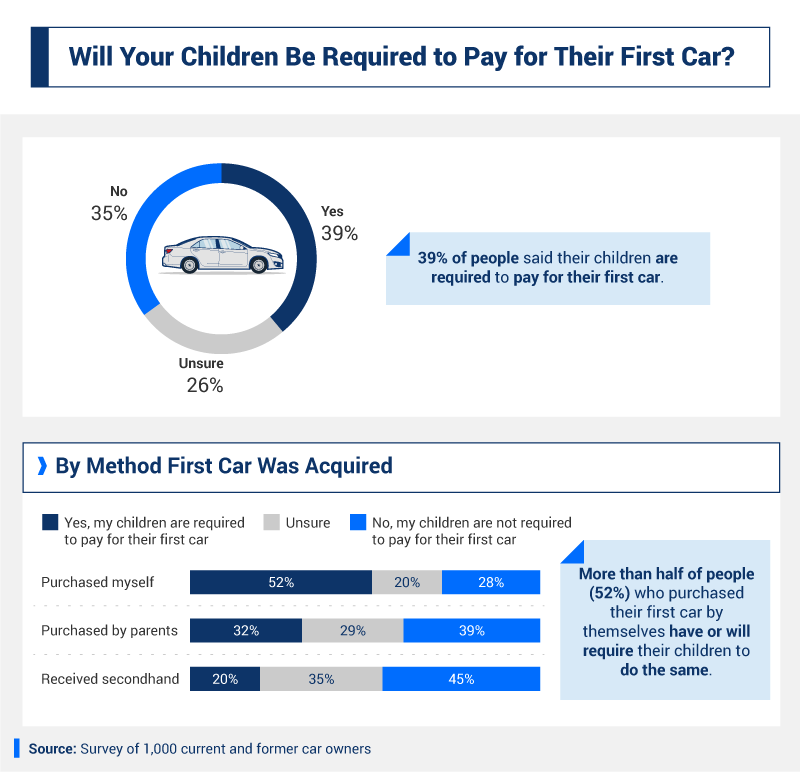It's Easier Here.
Leith Cars Blog

Cars are more than inanimate objects in the American psyche: They’ve come to represent liberty, flexibility, and growing up. For many, the car is a big part of who they are. But the method of acquiring the actual car may represent an even bigger part of who they are, as we recently found out.
After surveying 1,000 people across the U.S., we learned how a person’s first car impacted their lives down the road — pun intended. The extent to which a person has autonomy over their first-car decision (as opposed to parental verdicts) can ultimately impact the level of appreciation and enjoyment down the road. Both the reasons for wanting the car and the methods for obtaining it varied widely amongst respondents, and often contributed to the type of car owner they later became. Join us as we unpack their exciting and often emotional first car journey.
The Perks of Getting Your First Car
As respondents quickly revealed, there’s something beyond price that provides the real value of a first car. The ability to go somewhere without your parents, mingle with friends more easily, or just feeling like an adult, even if the car is sitting in the garage. For this part of our study, we asked respondents to reflect on some of these less tangible (and more emotional) perks of getting a first car.

Most were in agreement that their first car gave them more social opportunities. Eighty-two percent of respondents overall agreed that their first car made them more social. Though 20-somethings are more able to be social even without a car today (through smartphones and Wi-Fi), this wasn’t necessarily the case for many in their 50s or above. The car provided a literal connection in a time where the internet connection wasn’t possible. That said, the impetus for these less tangible benefits may not have been driven just by technological differences.
Even though most respondents agreed that the car made them more responsible, gave them more work opportunities, and even made them a harder worker, it was the older respondents that felt even more strongly about all of these things. Without wi-fi as an explanation, it’s likely that their increased likelihood of having obtained the car themselves would have led to all of these less tangible benefits more readily. In other words, paying for something yourself may make you more likely to cherish it and cognizant of what it’s really offering you. At least that’s what the data would suggest.
That First-Time Feeling
Next we wanted to clearly understand how a person’s “first car” comes to fruition in the U.S. We asked respondents to describe the car, how long they drove it, and how much say they had in the purchasing decision.

In spite of this being Americans’ very first car, buyers demonstrated a fair amount of autonomy in the decision-making. Sixty-six percent were able to say they chose the car themselves, regardless of who was making the actual purchase. That said, the affordable route was even more common: 77% of first-time car owners opted for a used vehicle.
There were a few key differences in the first car purchase across generations and age groups, however. Younger respondents were much more likely to still be driving their first-ever cars, but they were also more often getting to choose new cars, even if they weren’t the ones paying for it. Though these younger respondents haven’t driven the car as long yet, we may see them hold onto the cars for longer considering the flexibility in choices and prices they had. Currently, the average time to hold onto a first car is 4.2 years. As for how far their first car was driven, numbers seemed to hover around the 40K mile range.
The average number of miles people drive in their first car was as follows:
- Overall: 43K miles
- Among people in their 20s: 38.1K miles
- Among people in their 30s: 46.4K miles
- Among people in their 40s: 48.7K miles
- Among people aged 50+: 38.9K miles
This wasn’t the only area where generations severely differed in first-car approach, however. The next part of our study factors in these age gaps as well.
The Road to Your First Car
Before respondents could enjoy the fruits of a new car, like newfound social freedom, they had to figure out a way to bring it home. Would they be purchasing the car themselves, or receiving a little help? And what about insurance? The next part of our analysis dives into these obstacles, and asks respondents how much they paid, as well as who was ultimately responsible for insurance payments.

When recalling the glory days of the first-time car buying process, Gen X and Baby Boomers recalled more autonomy than did Millennials. That said, Baby Boomers also received less financial help than their younger counterparts. Whether working odd jobs or setting up a viable payment plan, Baby Boomers were more likely to be financially responsible for their own vehicle. This applied not only for the initial down payment on the car itself, but also the monthly payments and insurance payments thereafter. In fact, 56% of this generation was responsible for the entirety of vehicle insurance payments, compared to just 39% of millennials.
Looking back at how much participants actually paid for their first vehicle, younger generations again appeared to be living large but not on their own dime. The average cost of the first vehicle for a millennial was $10,800, while for Baby Boomers it was just $3,500. Though inflation is certainly at play here, a dollar’s value typically only decreases by a few percentage points each year. Instead, the price difference is likely reflective of what we saw earlier: Younger respondents were more likely to receive new cars of their choosing that they didn’t have to finance themselves.
First Make And Model
Of course, respondents were also excited to recall what their first car actually looked like. As they reminisced over the experience, certain makes and models were evidently more popular choices than others.

Honda took the top one and two spots for the most popular first car. Their Civic and Accord models were the respective first- and second-place winners. Today, the new 2020 Honda Civic will typically cost around $20,000. Toyotas were also popular for first-time car buyers, which cost just slightly more than the Civic for their 2020 Corolla model.
The most common choice of all first cars was a sedan, whose technical definition is “a 2- or 4-door automobile seating four or more persons and usually having a permanent top.”Nearly 60% of first-time car buyers went this route.
First Car Appreciation
Both money and cars often have strong emotional ties, with the first car possibly being the strongest of them all. The thrill of the freedom associated with your first car is one many people never forget. What we discovered was that the ways in which respondents purchased the vehicles were also not soon forgotten, and often impacted how much a person actually appreciated their brand new ride.
The next part of this study compares those who had paid for their own cars against those who had received some type of financial assistance from parents or received their car seconhand. We then were able to see the differences in the way these three groups appreciated their cars, how often they got into accidents, and whether the hard work of paying for your car influenced your career later on.

Satisfaction came to those who worked hard for it. People who purchased (or mostly purchased) their first car for themselves were noticeably more likely to be satisfied: 63% of those who bought the car themselves were “very satisfied,” compared to just 57% of people who had financial help from a parent. Those who received their first car as a hand-me-down were the least satisfied of all.
Interestingly, people who paid for their first car were much more likely to be satisfied in their career as well. Perhaps paying for your first car denotes a valuable life lesson in work ethic and responsibility. Or maybe working for a car early on makes a person more appreciative (and more satisfied) with the things they have. Either way, people who purchased their own cars were 60% more likely to feel satisfied with their job than those who had leaned on their parents.
In perhaps the strongest argument for working to buy the car yourself, we found that people who paid for their first car were also more likely to report having never been in an accident for which they were responsible.
Future of First Cars
The last part of our study asked participants to put themselves in their parents shoes, or to imagine themselves as parents one day. One day, their child will grow up and likely want to have his or her own car for the same reasons they once did. The question we must ask then is how will they respond?

Although a large portion of respondents (26%) were unsure of how exactly they would handle their child’s first car financially, an even larger portion (39%) were already sure their children would be paying for the car themselves. Perhaps they had experienced the same phenomenon this study previously uncovered: that through the effort of coming up with the money yourself, the love for the car grew, and the driver would actually become safer.
Respondents who had experienced this phenomenon first-hand were most adamant about adhering to its benefits. Once we categorized respondents by whether they had paid for their first car themselves, we noticed immediately that they were much more likely to require their children to do the same. More than half of respondents who had purchased the car for themselves, regardless of age, also planned on requiring their children to pay for their own car as well. Only 32% of people whose parents bought the car for them were going to flip the switch and make their own child pay for the car.
Cars, Kids, and Futures
Before this study, we may have wondered why anybody wouldn’t want a car purchased for them. It sounds so easy, right? Well, the data would ultimately argue that there are many personal benefits to purchasing your own vehicle. Those who had to pay for the car themselves were not only more appreciative of the vehicle, but they were more satisfied with their careers and even safer on the road. The data also showed, however, that the trend of working for your car yourself seems to be dying down in younger generations.
As you reflect on your own approach to car buying or even imagine what you will one day do for your children once they get their license, you’ll want to make sure you’re in expert hands. One way to find an expert is by finding a car dealer you trust. LeithCars.com has been the name North Carolinians have trusted for over 50 years, and Leith would love to share that first car buying experience with you and your family. With a variety of ways to purchase, from buying online to in-store visits, LeithCars.com has thousands of new and pre-owned vehicles.
Methodology
We conducted a survey of 1,000 people who had owned at least one vehicle. Respondents were then asked to answer questions about their first vehicle.
Forty-four percent of our respondents identified as female, 56% identified as male, and less than 1% identified as a gender not listed on our survey. Respondents ranged in age from 18 to 77 with a mean of 39 and a standard deviation of 12.9.
One percent of our respondents were younger than 20, 27% were in their 20s, 32% were in their 30s, 19% were in their 40s, and 21% were 50 or older.
The average respondent had owned three vehicles.
Limitations
It is possible that with more respondents from each demographic, we may have been able to gain better insight.The findings on this page rely on self-report and, as such, are susceptible to exaggeration or selective memory.
No statistical testing was performed. The claims listed above are based on means alone and are presented for informational purposes.
Fair Use Statement
Know someone who could benefit from our research on first-time car buying? There’s certainly a lot to learn. We hope you’ll share the information in this project with anybody who could benefit. All we ask is that your purposes are noncommercial and that you link back here. This way, other readers can view the entire project and understand the methodology and limitations. This also gives credit to the contributors whose efforts made this study possible.
More from my site








